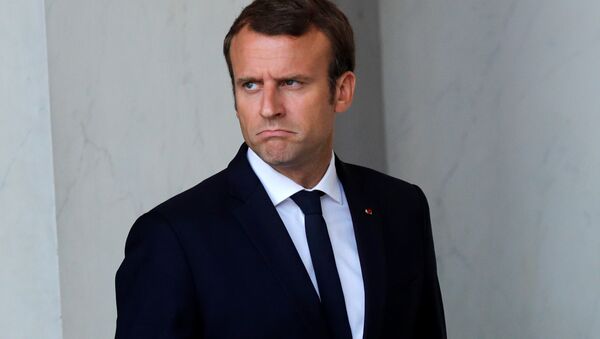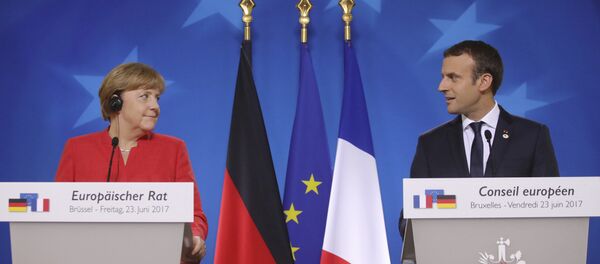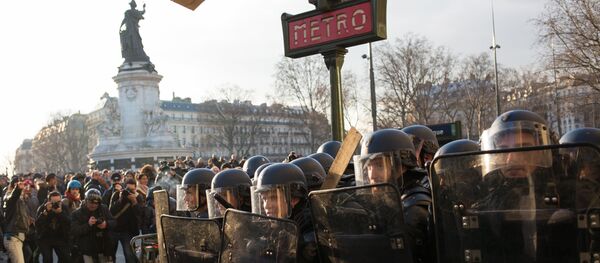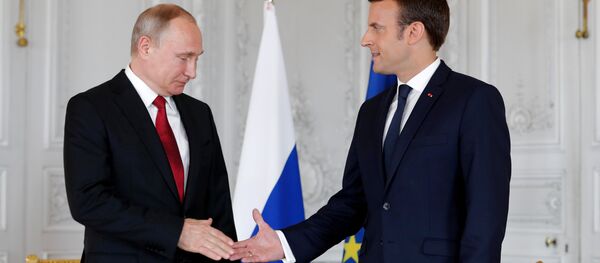PARIS (Sputnik) — The party of French President Emmanuel Macron, La Republique En Marche (LREM) failed to win the majority at the recent Senate election, possibly due to the new government's tough policy toward regional authorities, experts told Sputnik.
Failure To Repeat Assembly Success
Senatorial elections were held on Sunday to replace 170 outgoing senators in a 348-seat upper chamber of the French parliament.
Thirty-four senators in constituencies with one or two senators were chosen using the two-round majority vote, while the rest, in constituencies with three or more senators, were elected based on the proportional representation. The senators are elected by an electoral college in each department, which is made up of parliament members representing the region and delegates from municipal councils. The latter account for 95 percent of the members of the electoral college.
The Communist, Republican and Citizen group has 18 members, the European Democratic and Social Rally group has 16 members and 17 senators are not attached to any group.
At the same time, LREM has 313 lawmakers in the 577-seat lower chamber of the parliament, following June elections, and is backed by representatives of several other parties, which means that Macron may expect the majority of 395.
Regional Policy
According to Mariette Sineau, the head of the center for political science research center (CEVIPOF), there were several reasons for LREM's poor results, including certain policies concerning regional authorities.
"I have to point out that Emmanuel Macron made a range of announcements regarding the regional departments which turned out to be extremely damaging for him (the reducing the number of deputies, the abolishment of the housing tax, the withdrawal of parliamentary immunity)," Sineau told Sputnik.
Eddy Fougier, a political science researcher at IRIS center, also explained the LREM failure at the senatorial elections by tough regional reforms.
"The number of announcements made by the power aims to reduce some regional subsidies, cancel certain number of advantages. The government wants to reduce the number of subsidized contracts for associations of simply for the local authorities. Obviously there is an opposition to this," Fougier told Sputnik.
According to the expert, the proposed measures created the impression that local authorities would have "less financial and human capital."
"So automatically there is a 'vote of sanctions' against the politics of the new power," Fougier said.
The expert explained that Macron's government would do well to win support of the regional authorities, although it did not necessarily need them to govern.
"His ambition is to have the mayor’s offices, regions and local representatives. If he wanted that ambition to come true he did not start well, it’s necessary that he change his politics a bit. His image is that of a representative of the elites disconnected from the real world," Fougier said.
Fougier also mentioned that the right-wing National Front (FN) did not have enough elected officials to ensure that it had more senators.
"It’s once again a mechanic effect, to have more elected officials you have to have more elected officials, it’s a cumulative effect. It is the kind of vote that eliminates peripheral political powers," the expert said.
Consequences For President's Reforms
Fougier said that the Senate could make it difficult for Macron to pass certain legislation.
"The Senate can slow down the elaboration of certain texts, and especially it blocks the eventual initiative of Macron to modify the constitution … I would say that the Senate ruled by the right is a counter-power to Macron, which limits his ability to modify the constitution and slows down the adaptation of new legislation," the expert said.
Sineau said that Macron's project to change the Constitution would require the three-fifths of the vote of the two chambers of the parliament, or 555 votes, which, at present, the president does not have.
Macron has said that he would like to amend the Constitution, in particular, to give more administrative "flexibility" to the overseas region of Reunion. The governments of Martinique and Guadeloupe may use various exceptions that allow them to introduce regulation in certain domains, for example, environment and energy. However, paragraph 5 of Article 73 of the Constitution excludes Reunion from enjoying similar liberties.







